” Hold me my daddy, I never felt lower than dirt on the
floor. I say hold me my daddy, I never felt like crying oceans
before.
If this means war, why are we in it? Might’ve fired off a couple of
rounds, I didn’t mean to begin it. If these are the bullets that
every father and son must chew, well then hold me my daddy, I forgot
to say I love you.
Hold me my daddy, it hurts me to see grow men fighting this way. I
say hold me my daddy, the young and the old dog aren’t having their
day.
This civil war, why are we in it? There’s nobody on this flat
earth, would ever want to win it. If these are the hot coals that
every father and son walks through, well then hold me my daddy, I
forgot to say I love you.
And if you agree we can make amends. All this squabbling I’ve
hated. In another time and another place where our history bends, we
could’ve been the best of friends and not merely related.
Well these are the right words to say, they’re difficult but still
true, well then hold me my daddy, I forgot to say I love you. (Hold
him. Tight. Hold him like he was a baby.)” ( Hold Me My Daddy, Andy Partridge XTC )
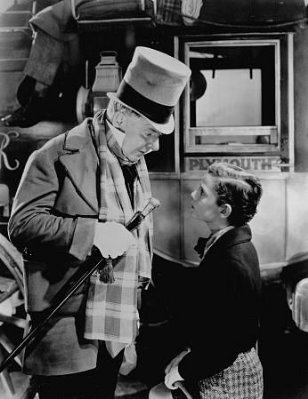
W.C. Fields as irresponsible father Mr. Micawber .Robin Bates:''Instead I saw severe conflict. There is Oedipus, of course, who unknowingly kills his father, thereby bringing a curse upon Thebes. There is The Odyssey, where the son is just beginning to find his own way when his famous father returns, starts running the show again, and saves the day. (In the process, Telemachus is once again relegated to a side character.) In a contrasting story, there is Prince Hal, a source of grief to his father who removes the crown before his father is even dead (although, in his defense, Hal thinks Henry is dead) and then goes on to become a greater man than his father. And there is Hamlet, taking grim marching orders from a father who returns from the grave. ''
Homer’s ” The Iliad” suggests, fatherly affection is not touchy-feely, nor is it necessarily given unconditionally or freely. Rather, a son must earn his father’s respect and admiration, and it is by leaving home and fighting his own battles that the son is able to achieve this. Further, the shared beliefs and values of father and son are not necessarily established or inculcated by direct contact. Distance, then, becomes one of the most important mediating factors that allows the quality of the father-son relationship to be defined and established. What is surprising, in The Iliad and the Odyssey however, is that the father-son affection in both epic poems is achieved only through distance. Both father-son pairs spend more time apart than they do together, and it is through distance that they develop admiration and love for one another.
One of he great pedagogic sagas of all time is the education of John Stuart Mill by his father James Mill. John Stuart learned how to read Greek at three and prattled in latin at eight. At the latter age, he had also read Greek prose authors such as the Memorials of Socrates, the lives of the philosophers by Diogenes, the first six dialogues of Plato, all of which he more or less comprehended. So too, by the age of twelve, having worked through arithmetic, and having read through much of history and literature, he was given a rigorous training by his father in logic and political economy.
John Stuart was undoubtedly considered a genius. His IQ is calculated to have been 159, that is ahead of 99.99% of the population.How brilliant is this? From Michael Ferguson, Polymathica.com : ”Several studies have been undertaken to determine the IQs of eminent groups. The Cambridge University science faculty was found to have a mean IQ of 126.5 and a standard deviation of 6.3. (Nature, 1967, 213, 442). The first year Harvard Medical School class had a mean IQ of 125.5 and a standard deviation of 6.5 (Wechsler’s Measurement and Appraisal of Adult Intelligence by Joseph D. Matarazzo, 5th edition). Top level executives were found to have a mean IQ of 124 and a standard deviation of 7.9. (Personnel Psychology, 1956, 9, 207-209) In total, the unambiguously elite professions have a mean IQ of around 126 and a standard deviation of 6.7. From this we can deduce that eminence is characterized at one standard deviatin by an IQ of 133, at two standard deviations at 140 and at three standard deviations at 146….From the preceding we should conclude that claims that any modern eminent persib has ab IQ in excess of 160 should be regarded with extreme skepticism.”
. \”Ivan the Terrible and His Son Ivan.\” 1885. Canvas, oil. The State Tretyakov Picture Gallery in Moscow”]![father3 Artist Ilya Repin [1844-1930]. "Ivan the Terrible and His Son Ivan." 1885. Canvas, oil. The State Tretyakov Picture Gallery in Moscow](/wp-content/uploads/2010/06/father3.jpg) With such an education, or possibly in spite of it, the child prodigy became the eminent Victorian sage and social theorist, writing imperishable books on logic, political economy, and of course, the classic ”On Liberty”. If a man ever seemed the successful product of a careful and caring education, designed to produce the epitome of the rational man, it is John Stuart Mill. And credit for this achievement must go to his father, James Mill , who, famous in his own time, has slipped into obscurity today partly as a result of standing in the shadow of the son whom he educated so successfully.
With such an education, or possibly in spite of it, the child prodigy became the eminent Victorian sage and social theorist, writing imperishable books on logic, political economy, and of course, the classic ”On Liberty”. If a man ever seemed the successful product of a careful and caring education, designed to produce the epitome of the rational man, it is John Stuart Mill. And credit for this achievement must go to his father, James Mill , who, famous in his own time, has slipped into obscurity today partly as a result of standing in the shadow of the son whom he educated so successfully.
There is another way, however, of looking at the Mills. It places less emphasis on the ”rational” and more on the irrational aspects of the relationship. It takes the chapter in John Stuart’s ”Autobiography” called ”A Crisis in my Mental History” and attempts to understand it at least as much as an emotional crisis. Seen in this light, the ”Crisis” becomes the dramatic moment in a father-son relationship whose elements become increasingly to dominate the existence and consciousness of modern man . By the end of the nineteenth century, where marx had talked of class conflict as a central historical evolution, Freud spoke of Oedipal conflict. Now, generational change was made to stand at the heart of social change.

This cartoon mocks John Stuart Mill's attempt to replace the term 'man' with 'person' in the second Reform Bill of 1867. Mill, a social reformer and MP, became known as a champion of women's rights. His proposal was greeted with laughter in the House of Commons, and defeated by 76 votes to 196. PRO LIBRARY Punch, p.129 (30 March 1867)
Before Freud of course, there had been father-son conflicts. In slowly changing societies, however, where son’s merely replaced in the fullness of time their more powerful and knowing fathers, the revolts tended to fizzle out into filial submission. With the coming age of revolutions; both industrial and political, fathers were often no longer perceived as figures of authority, but rather as anachronistic elders to be displaced rather than replaced. A glance at Turgenev’s ”Fathers and Sons” tells us what happened. Freud merely put into ”scientific” language what was present and growing in the Western literary consciousness. His real achievement was to show that generational strife was rooted in the unconsciousness.
With this insight, Freud could then say, ”The freeing of an individual, as he grows up, from the authority of his parents is one of the most necessary though one of the most painful results brought about by the course of his development. It is quite essential that that liberation should occur and it may be presumed that it has been to some extent achieved by everyone who has reached a normal state. Indeed, the whole progress of society rests upon the opposition between successive generations”. Later, Freud added, ”In the second half of childhood a change sets in the boy’s relation to his father… He finds that his father is no longer the mightiest, wisest and richest of beings; he grows dissatisfied with him, he learns to criticize him and to estimate his place in society; and then, as a rule, he makes him pay heavily for the disappointment that has been caused by him. Everything that is hopeful, as well as everything that is unwelcome, in the new generation is determined by this detachment from the father.”
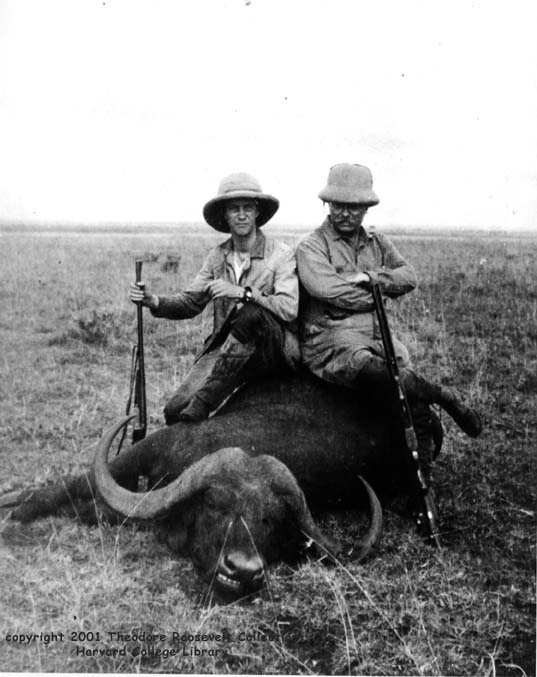
Aaron Bady: ''After he was done being President, Teddy Roosevelt decided to unwind by going on safari in East Africa and blasting the living bejeezus out of everything he could find. Ostensibly, he was there to get natural history specimens for the Smithsonian, but his heart was really in the simpler pleasures of hunt. Whatever else TR was, he was a man who like to shoot things. A lot. He also took his son Kermit with him, but other than dedicating African Game Trails to “My Side-Partner,” he’s interestingly reluctant to frame the trip as the big father-son picnic it was. Instead, he displaces the problem of the father-son relationship (which is a problem for him for various reasons) onto the African landscape itself. Teddy’s epigram kind of says it all: “He loved the great game as if he were their father.” Because nothing says paternal love like a bullet to the brainpan.""
While it is true that children matured more slowly in the early and middle nineteenth century than they do today, largely due to diet, it is obvious that so many young people were bound to constitute a potentially explosive force. If we remember that these young people were competing in a society in which the industrial and political revolutions had opened up new avenues of social mobility and career opportunities, we can see the possibilities. Yet two factors held the potential rebellion in harness. One was open migration to underdeveloped areas, which drained off many of the most energetic and rebellios youths; the other was the relatively heavy hand of traditional and paternal authority.
In the nineteenth century, then, the real fight had just begun, marked by what was still a heavy heart on the part of the young. It is with this in mind that we might profitably examine John Stuart’s relationship with his father James.
This last statement is rather sweeping, but in the present tense, it carries a good deal of conviction. We seem to be paying ”heavily” for the ”disappointment” of sons in their fathers and mothers. Thus, a re-examination of the father-son relationship of the Mills might have a certain topical appeal. There is a nice irony too, in looking at the Mills with the aid of Freudian insight. It was freud who translated the twelfth volume of John Stuart Mill’s collected works into German, a volume composed of essays on the labor question, socialism, Plato, and the enfranchisement of women.
Apropos to the last essay,k which in fact, many commentators presume to have been written by harriet, with John Stuart merely re-writing , or editing it, Freud remarked: ”… the relationship between the sexes. That is altogether a point with Mill where one simply cannot find him human. His autobiography is so prudish or so ethereal that one could never gather from it that human beings consist of men and women and that this distinction is the most significant one that exists.”
If we are to evaluate Freud’s harsh judgement, we need to look for ourselves at the Mills, father as well as son. We might pause for a moment, however to examine a part of the social setting for this generational relationship. In the early nineteenth century, population was growing by leaps and bounds; france for example,went from twenty million in 1750 to twenty nine million in 1820: a one third growth. Much of this increase was attributable to a decline in infant mortality. One obvious result was a large increase in the number of young people and in their political activism; one need only think of Mazzini’s Young Italy. Thus, it is estimated that in france in 1789 the ratio of youths of fifteen to twenty-nine to persons thirty years and over was almost 61 per cent, compared with 38 percent in the May ’68 era. In Great Britain, when John Stuart was himself thirty-four, the percentage was 77 per cent.
Crumpled bits of paper
Filled with imperfect thought
Stilted conversations
I’m afraid that’s all we’ve got
You say you just don’t see it
He says it’s perfect sense
You just can’t get agreement
In this present tense
We all talk a different language
Talking in defence
Say it loud, say it clear
You can listen as well as you hear
It’s too late when we die
To admit we don’t see eye to eye
So we open up a quarrel
Between the present and the past
We only sacrifice the future
It’s the bitterness that lasts
Say it loud, say it clear
You can listen as well as you hear
It’s too late when we die
To admit we don’t see eye to eye
I wasn’t there that morning
When my Father passed away
I didn’t get to tell him
All the things I had to say
I think I caught his spirit
Later that same year
I’m sure I heard his echo
In my baby’s new born tears
I just wish I could have told him in the living years ( The Living Years. Mike and the Mechanics )


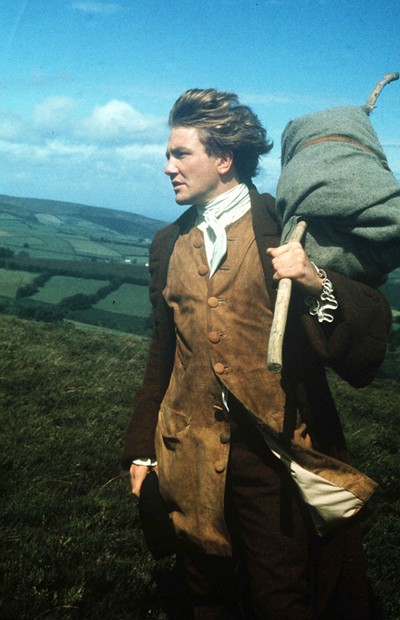
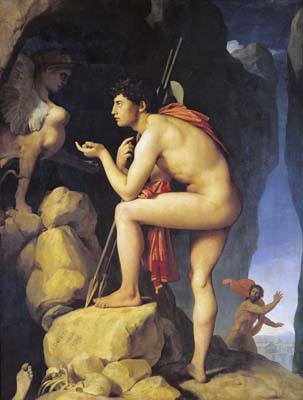 Jean Auguste Dominique Ingres - Oedipus and the Sphinx
Jean Auguste Dominique Ingres - Oedipus and the Sphinx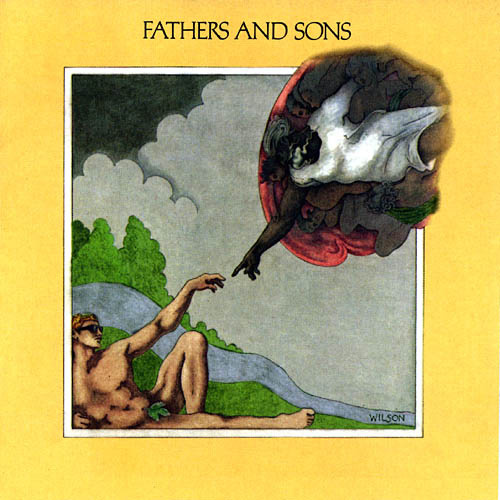



 COMMENTS
COMMENTS